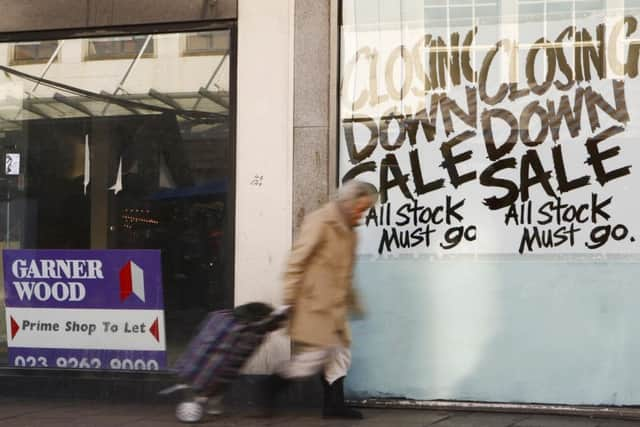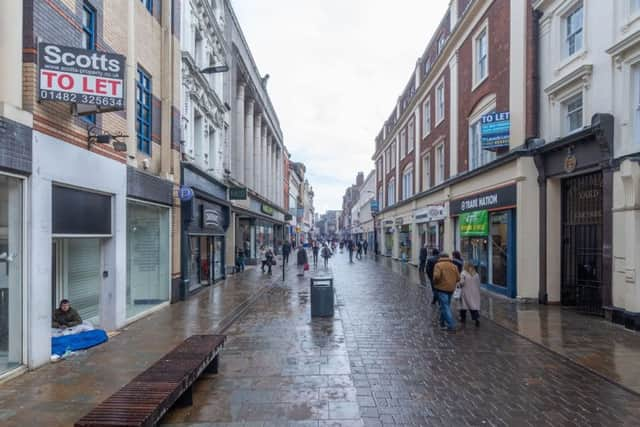Boris Johnson must heed Save Our Shops call if he wants to retain his new friends in the North - Andrew Vine
More than in the affluent south, the plight of high streets in Yorkshire and the rest of the north is especially acute. Lower incomes in our part of the world are only aggravating the problems faced by retailers.
Advertisement
Hide AdAdvertisement
Hide AdHow grim the picture is for retailing was underlined at the weekend, when the last of Mothercare’s 79 shops shut, with the loss of 2,600 jobs.


More bad news is on the way. By the end of this month, Debenhams will have closed 22 shops, putting 660 people out of work.
These come on top of more than 143,000 job losses last year, according to the Centre for Retail Research – an increase of more than 25,000 compared to 2018.
If this trend continues, says the British Retail Consortium, there will be 900,000 fewer people working in shops in a decade’s time.
Advertisement
Hide AdAdvertisement
Hide AdFigures like this ought to be ringing alarm bells for the Prime Minister and his Chancellor. If job losses on this sort of scale were happening in manufacturing or financial services, the Government would quite rightly regard it as a matter of national concern.


But because it’s happening in retail, this issue is not receiving anything like the amount of attention – or intervention – that it deserves.
On a human level, what is to become of these tens of thousands of people whose livelihoods are disappearing? Job creation isn’t happening at such a rate that there are new positions for them to walk into.
Behind the statistics must lie countless stories of desperation and a struggle to put food on the table or keep up with mortgages. And it’s also about the effect this is having on our high streets. These relentless waves of shop closures don’t just have a human cost. They are immensely damaging to the social fabric of communities large and small.
Advertisement
Hide AdAdvertisement
Hide AdHollowed-out shopping streets, full of empty premises gradually sinking into scruffiness and dereliction, are becoming symbols of urban decline. They detract from the look and feel of our towns and cities, turning them from vibrant, attractive places into unkempt and unloved shells of what they once were.
The villain is, of course, the internet, where £1 of every £5 is now spent. And in a vicious cycle for traditional retailers and those who work for them, the more shops that close, the more likely it is that consumers go online to find what is no longer available on the high street.
What our shopping streets might look like in a decade’s time if the closures and job losses continue doesn’t bear thinking about, and this is why the Government needs to get a grip on the issue.
Unless it does, online competition is going to destroy town and city centres. That cannot be allowed to happen, and those within the Government who might argue that this is a free-market issue in which it should not interfere need to think again.
Advertisement
Hide AdAdvertisement
Hide AdChancellor Sajid Javid should make a start with his Budget in March, by giving retailers a fighting chance of competing with online rivals.
That means addressing the amount of tax paid by online giants such as Amazon. It’s been a scandal for years that multinational corporations with massive sales in Britain can, quite legally, pay relatively small amounts of tax here by moving earnings through networks of accounts in other countries.
The retail tycoon Mike Ashley – owner of Sports Direct, House of Fraser and Debenhams – isn’t a particularly appealing figure, but he knows his business and was spot-on when he told MPs almost two years ago that if they wanted to save the sector, they should impose a 20 per cent online sales tax.
The proceeds from that, he suggested, could then be channelled to local authorities so they could cut business rates and promote investment in high streets.
Advertisement
Hide AdAdvertisement
Hide AdAt the time, a Government paralysed by Brexit and with no working majority would not have dared to take such a step.
But Boris Johnson has no such constraints on him, and should have the courage to be radical. He’s pledged to give the north a fairer deal, and that means stepping in to help its high streets.
An online sales tax would be a good first step, but there also needs to be a rethink of the whole business rates regime to prevent shops being undercut by out-of-town online distribution warehouses.
Advertisement
Hide AdAdvertisement
Hide AdBoosting Yorkshire’s economy has to mean saving its shops and the livelihoods of those who work in them. Cities and towns cannot be said to be thriving if there is a remorseless process of creeping dereliction at their hearts.
It’s time the Government woke up to this, and stopped regarding retail as a poor relation that is less deserving of support than other industries.